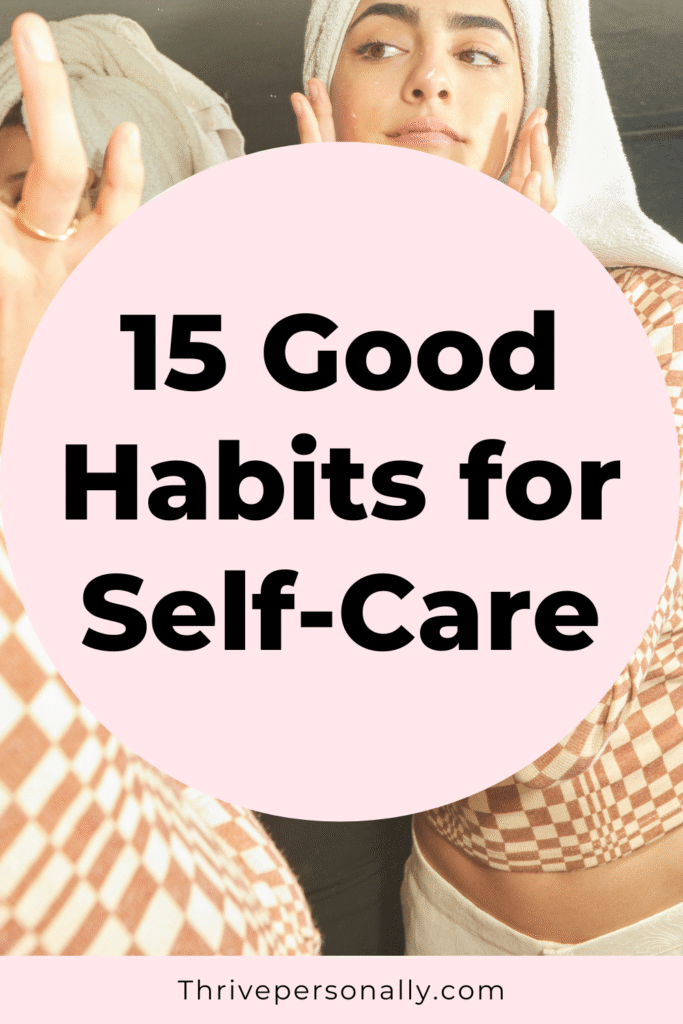Self-care is not selfish. It is something you must do to remain strong, happy, and healthy. However, in a fast-moving world, we forget to take stock of ourselves. You continue, continue to progress, continue doing things for others, but in a moment, your body and your mind start to wear. Then self-care is much more than a nice idea. It becomes necessary.
Self-care does not have anything to do with costly spa treatments or long vacations. It can be small things in everyday life that help you stay grounded, refreshed, and in tune with yourself. It is what helps you show up as your best, even when life gets tough.
Today, this post will take you through 15 good self-care habits that you can include in your daily routines. You don’t need to do all of them at once. Start small, do them often, and you’ll soon begin to feel much better.
1. Sleep Enough Each Night
Your body needs to rest. It’s during sleep that your body heals itself, your mind clears up, and your energy gets restored. Without enough sleep, you may feel tired, moody, and unable to focus. Over time, lack of sleep affects your health, attitude, relationships, and even your work.
Most adults should get between 7 to 9 hours of sleep each night, according to the National Sleep Foundation. That’s not just a number. That’s what your body needs to function well. Try to go to bed and wake up at the same time every day, even on weekends. It helps your body know when it’s time to rest and when it’s time to wake up.
Read also: 51 Bedtime Affirmations to Help You Sleep Better and Feel Peaceful
2. Drink Enough Water
Your body is mostly made up of water. Every cell, tissue, and organ needs water to work properly. When you don’t drink enough, you get headaches, feel tired, and your skin may look dry. Water helps you stay alert, boosts digestion, and keeps your energy up.
Drink water every day, not just when you feel thirsty. Keep a bottle close by to remind yourself. A general rule is about 8 cups a day, more if it’s hot outside or if you’re moving around a lot.
Read also: 10 Ways to Start Your Day Off Right
3. Eat Foods That Give You Energy
What you eat affects how you feel. Too much sugar or junk food might make you feel good for a short time but leave you crashing later. Fruits, veggies, whole grains, and protein help you feel full, strong, and healthy.
Good self-care means feeding your body the right way. Try to eat balanced meals and notice how different foods make you feel. This helps you make better choices that support your body instead of just satisfying a craving.
4. Move Your Body Every Day
You don’t have to do hard workouts or spend hours at the gym. Just 15–30 minutes of movement each day can boost your mood, help your heart, and get your mind working. Walking, stretching, dancing, or biking are great ways to care for your body.
Exercise is also a great way to lower stress. The Mayo Clinic says that it can help clear your mind and make you feel stronger.
Read also: 105 Affirmations to Overcome Your Fear
5. Stop, Breathe, and Rest
The world is noisy and full of distractions. Making time for quiet moments each day helps you relax and feel more grounded. You can do this by sitting still, breathing deeply, or using simple breathing exercises.
Stillness doesn’t mean doing nothing. It means pausing to check in with how you feel. This can lower stress, improve sleep, and help you make better choices.
6. Stick to a Simple Daily Routine
Having a routine brings structure to your day. Knowing what to expect helps you feel calm and focused. Your routine might include wake-up times, meals, work breaks, and bedtime.
Even when life gets busy, a simple schedule reminds your mind and body that things are okay. It helps you feel safe and cared for.
7. Take Breaks When You Need Them
You’re not a machine. You need breaks between tasks to reset your mind. Taking a short walk, turning off your phone, or closing your eyes for a moment can make a big difference.
Breaks aren’t wasted time. They are part of smart self-care. They help you return to work feeling fresh and ready.
8. Learn to Say No Without Feeling Guilty
You don’t have to say yes to everything. Sometimes the best way to care for yourself is to say no to people or tasks that drain your energy. Saying no creates space for what really matters.
Setting limits on your time and energy protects your mental and emotional health. You don’t have to be everything to everyone. You deserve to care for yourself first.
9. Spend Time in Nature
Being outside makes you feel alive. Nature calms your mind, lowers stress, and helps you feel connected. You don’t need to go on a hike. Just step outside, feel the sun, listen to birds, or walk on the grass.
According to research from the University of Exeter, just two hours a week in nature can improve your mental health. Spend some time outdoors every week, even if it’s just a few minutes a day.
10. Keep Your Room Clean and Tidy
Your environment affects how you feel. A messy room can make your mind feel messy too. Cleaning doesn’t have to take hours. Just putting things in place or making your bed can help.
A neat space helps you think clearly and feel more at peace. Start a habit of tidying up a little bit each day.
11. Speak Kindly to Yourself
How you talk to yourself matters. If you always criticize yourself, it hurts your confidence. Talk to yourself the way you’d talk to a good friend.
Kind self-talk helps you feel better about who you are. You don’t have to be perfect. You just need to be kind, loving, and patient with yourself.
12. Do One Thing Each Day That Makes You Smile
Self-care includes joy. Find time each day to laugh, relax, or enjoy yourself. It could be a song, a book, a hobby, or a call with someone you love.
You don’t have to wait for life to feel good. Smiles and laughter are part of healing. They help you keep going.
13. Ask for Help When You Need It
Asking for help isn’t weak. It’s smart and strong. Whether it’s talking to a friend, a coach, or a counselor, reaching out is part of caring for yourself.
There are trained people who can help with stress, sadness, and other issues. The National Institute of Mental Health says it’s normal and necessary to get support when you need it.
14. Limit Screen Time and Digital Noise
Too much time on your phone or computer can make you feel tired, nervous, or scattered. Take time each day to unplug. Use that time to rest, reflect, or do something off-screen.
Turning off your screen helps reset your brain and calm your body. It may even help you sleep better and focus more easily.
15. Practice Gratitude
Gratitude helps you focus on what you have instead of what you lack. You can practice gratitude by writing down things you’re thankful for each day or saying them before bed.
Research from UC Davis shows that gratitude can make people happier and more peaceful. It’s a simple habit with powerful results.
Final Thoughts
Self-care doesn’t wait for stress or burnout. It’s something you build into your life each day. These 15 habits aren’t big or fancy—they’re daily ways to care for your body, mind, and heart. They help you feel better, think clearer, and live more joyfully.
Start small. Pick two or three habits and practice them until they feel natural. Then add more. It’s not about being perfect. It’s about getting closer to yourself and what you need.
When you take care of yourself, you can give more to others. You become stronger, kinder, and more centered. And that’s something the world truly needs.
You matter. Your well-being matters. And one of the best gifts you can give yourself is to build strong self-care habits.
Save the pin for later



